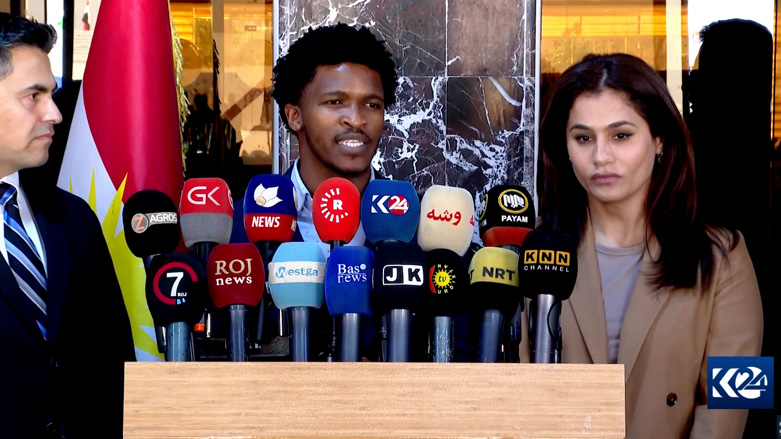The people of Kurdistan are my people: Mandela’s great-grandson
“The people of Kurdistan are my people. For we share a very similar plight and struggle throughout history.”

ERBIL (Kurdistan 24) – Siyabulela Mandela, the great-grandson of former South African President Nelson Mandela, on Thursday visited Halabja ahead of the 35th anniversary of the chemical attack on Halabja, on March 16, underlining his solidarity with the Kurdish people.
Today I had an opportunity to pay respect and condolences while visiting the Halabja Monument and learning about the painful history of the March 1988 Halabja chemical attack and Massacre against the Kurdish people. Gratitude to Mayor @nuxshanasih for receiving me. https://t.co/fJTFEqk5Pz
— Dr. Siyabulela Mandela (@Dr_SMandela) March 2, 2023
“I appreciate the opportunity to come here and really experience and to understand deeper some of the injustices and the crimes against humanity that took place here on March 16, 1988. It’s indeed a very sad thing what happened here to the people of Halabja.”
He also thanked his friend and former classmate, Dr. Yerevan Saeed, a native from Halabja, for encouraging him to visit and "meet the people of Halabja.” He also thanked Halabja’s Mayor, Nuxsha Nasih, for the hospitality during his visit.
“The people of Kurdistan are my people. For we share a very similar plight and struggle. He said he was grateful for the opportunity to visit Halabja and grieve for the victims who suffered from the injustices, crimes, and the genocide of 1988.”
Read More: Iraqi government should fulfill its 'moral duty' and compensate Halabja victims: PM Barzani
He said he had to hold back tears several times during his tour of the Halabja museum. “It is a very painful injustice, a crime, and I hope the memory of those that fell victim continues to live on. The world must know of the injustice that happened here.”
“(Nelson) Mandela always considered the people of Kurdistan as one of our own, for we share a similar history and a similar plight. That is why Mandela, when he was released in 1990, did not consider our freedom to be complete until the people of Kurdistan and all the other oppressed groups around the world achieved their own freedom.”
In 1992, Mandela refused to accept the Ataturk Peace Prize because of his concerns of human rights abuses, angering Turkey.
“So, for me, Mandela and the entire South African community, we believe the people of Kurdistan should be afforded their own right to self-determination and have equal access to universal declaration of human rights as declared by the United Nations in 1948.”
“Throughout history, since the 1920s, we have drawn lessons from the resilience and the struggles of the people of Kurdistan, a history similar to our own.”
He added that during the time of apartheid in South Africa, "we also suffered from injustices. A genocide, similar to the one committed against the Kurds, was planned for my people by the apartheid regime. They wanted to completely eliminate the Black people in South Africa. This shared history with the people of Kurdistan bonds us against inhumanity."
He also stressed that the people of Halabja are not alone and he hoped that bridges could be built between Halabja and other parts of the world, such as South Africa.
“That is why it was necessary to take the time to come and pay homage to the victims of the 1988 genocide.”